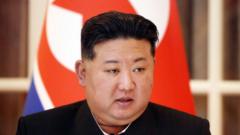In a strategic escalation of trade tensions, the Trump administration has suspended the sale of crucial technologies, including jet engines and semiconductors, to China following Beijing's export restrictions, heightening concerns about supply chain warfare.
U.S. Enacts Export Restrictions on Key Technologies to China

U.S. Enacts Export Restrictions on Key Technologies to China
The Trump administration halts exports of critical technologies to China in a tit-for-tat response to Beijing's earlier restrictions on U.S. mineral exports.
In a bold move reflecting the intensifying trade conflict, the Trump administration has paused exports of key U.S. technologies to China, which include jet engines, semiconductors, and specific chemical products. This decision comes in the wake of China's recent restrictions on critical mineral exports to the United States, a measure seen as a potential threat to the supply chains of U.S. companies heavily reliant on these resources.
The friction between the world’s two largest economies is pushing them closer to what may be termed as supply chain warfare. As both Washington and Beijing attempt to assert dominance over essential economic assets, concerns grow over the possible implications for American companies that depend on these foreign technologies—especially the manufacturers of airplanes, vehicles, robotics, and chips.
This increasing strain complicates recent negotiations aimed at easing a long-standing trade dispute surrounding tariffs imposed by both nations. On May 12, U.S. and Chinese negotiators had tentatively agreed to a 90-day period intended to reduce the crippling tariffs affecting trade between the two countries while seeking a more sustainable resolution.
Treasury Secretary Scott Bessent previously indicated that there was a mutual understanding not to pursue economic decoupling. Nevertheless, the latest announcements from the administration signal ongoing punitive actions against China. Secretary of State Marco Rubio detailed plans to “aggressively revoke” visas for Chinese students in crucial educational domains or those affiliated with the Chinese Communist Party.
Despite anticipations from U.S. officials that Chinese authorities would ease their restrictions following the tariff discussions, it appears there is no sign of compliance on their part, further entrenching the stalemate in trade relations.






















